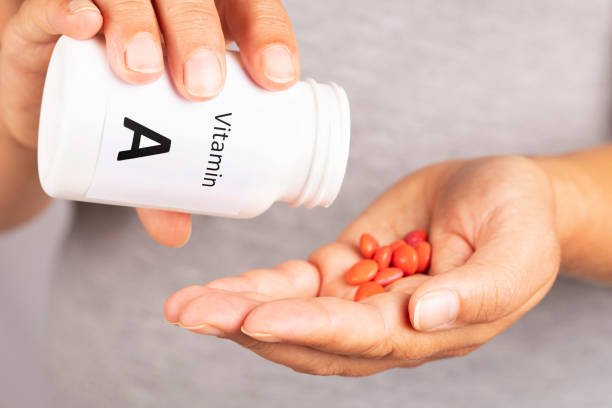Vitamin A is a fat-soluble vitamin that is essential for the proper functioning of the body. It exists in two forms: preformed vitamin A, which is found in animal sources such as liver, eggs, and dairy products, and provitamin A carotenoids, which are found in plant sources such as carrots, sweet potatoes, and leafy greens.

The Importance of Vitamin A
Intake of vitamin A is important because it is an essential nutrient that the body needs for various functions. Here are some reasons why it is important to consume vitamin A:
- 1. Vision: Vitamin A is crucial for maintaining good vision. It is a key component of the pigment rhodopsin, which is found in the retina of the eye and helps with low-light and color vision. A deficiency in vitamin A can lead to night blindness and, in severe cases, even total blindness.
- 2. Immune system function: Vitamin A plays a vital role in supporting a healthy immune system. It helps maintain the integrity of the skin and mucous membranes, which act as barriers against pathogens. It also plays a role in the production and function of white blood cells, which are essential for fighting off infections.
- 3. Reproduction and fetal development: Vitamin A is necessary for the production of sperm in males and plays a role in the development of the fetus during pregnancy. Adequate vitamin A intake is crucial for the proper growth and development of the embryo and fetus.
- 4. Cell growth and differentiation: Vitamin A is involved in regulating the growth and specialization of cells, which is important for maintaining healthy tissues and organs. It also plays a role in the maintenance of healthy skin, as it promotes the production of collagen and helps prevent dryness and flakiness.
In addition to these functions, vitamin A also has antioxidant properties, which means it helps protect cells from damage caused by harmful molecules called free radicals. This can help reduce the risk of chronic diseases such as heart disease and certain types of cancer.
It is important to obtain vitamin A from a balanced diet that includes a variety of fruits, vegetables, and other sources of this nutrient. Some good food sources of vitamin A include carrots, sweet potatoes, spinach, kale, liver, and dairy products. Including these foods in your diet can help ensure an adequate intake of vitamin A.

The Dangers of Excessive Vitamin A Intake
However, it is important to consume vitamin A in appropriate amounts to avoid toxicity. Excessive intake of vitamin A, especially in the form of supplements, can be harmful and may lead to symptoms such as nausea, dizziness, and even liver damage. It is recommended to follow the recommended dietary allowance (RDA) for vitamin A, which varies depending on age, sex, and life stage.
When the body stores excess amounts of vitamin A, primarily in the liver, it can lead to health risks.Acute vitamin A toxicity, also known as hypervitaminosis A, occurs when someone consumes very high doses of vitamin A within a short period of time. Symptoms of acute toxicity include severe headache, blurred vision, nausea, dizziness, muscle aches, and coordination problems. In severe cases, it can even lead to increased pressure in the cerebral spinal fluid, causing drowsiness, coma, and potentially death.
Chronic hypervitaminosis A, which occurs from regular consumption of high doses of vitamin A, can result in dry skin, painful muscles and joints, fatigue, depression, and abnormal liver test results.
Recommended Daily Intake of Vitamin A
The recommended daily intake of vitamin A varies depending on age, sex, and life stage. Here are the general intake recommendations for vitamin A:

– Infants (0-6 months): 400 micrograms (mcg) per day
– Infants (7-12 months): 500 mcg per day
– Children (1-3 years): 300 mcg per day
– Children (4-8 years): 400 mcg per day
– Children (9-13 years): 600 mcg per day
– Adolescents (14-18 years): 900 mcg per day for males, 700 mcg per day for females
– Adults (19 years and older): 900 mcg per day for males, 700 mcg per day for females
– Pregnant women: 770 mcg per day
– Breastfeeding women: 1,300 mcg per day
It’s important to note that these recommendations are for total vitamin A intake, which includes both preformed vitamin A (retinol) and provitamin A carotenoids (such as beta-carotene). The body can convert provitamin A carotenoids into vitamin A as needed.

